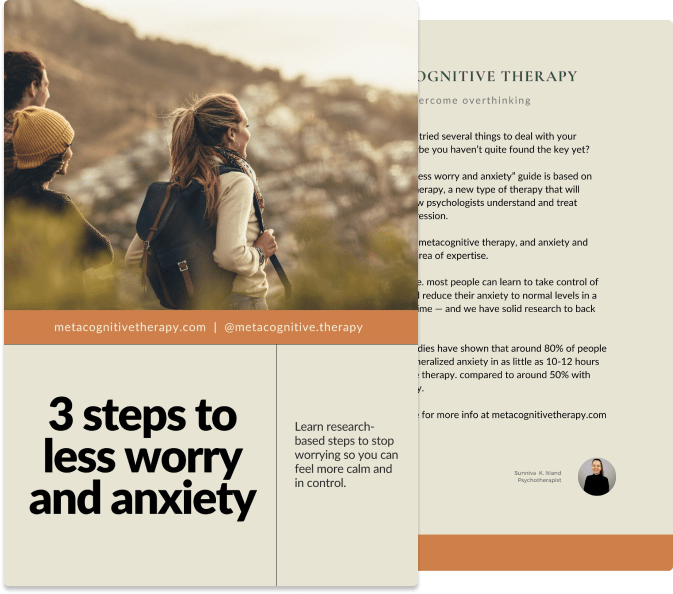How to reclaim your life from emetophobia with Metacognitive Therapy

Download our best tips on reducing anxiety and worrying
Learn three powerful metacognitive therapy steps to stop the worry cycle, reduce anxiety, and feel calmer in everyday life.
.jpeg)
.jpeg)
Emetophobia, the intense fear of vomiting, is a condition that can cause people to live in constant dread of becoming sick, or seeing others throw up.
It’s a phobia that can be so severe, some parents flee their homes when they suspect their kid has a stomach flu, which leads them to feel like terrible parents. Thankfully, there’s a method of therapy (Metacognitive Therapy) that’s proven effective for helping people overcome phobias like this one.
Understanding the real issue
To treat emetophobia, you need to recognize the actual problem: While most people assume the issue is vomiting, the real culprit isn’t throwing up… it’s the obsessive thinking about it. Many people with emetophobia haven't actually vomited in years, yet they spend countless hours a day consumed by worry and vigilance.
The fear manifests in several ways. You might be hyperaware of anything vomit-related in media, conversations, or daily life and once the thought enters your mind, it feels impossible to stop thinking about it. This can lead to continuously scanning your environment for potential dangers (signs of illness in others, contaminated food, or places that could make you sick.) This vigilance extends to physical symptom-monitoring, constantly checking if you feel nauseous, creating a cycle where the anxiety about feeling sick can actually make you feel nauseous.

Download our best tips on reducing anxiety and worrying
Learn three powerful metacognitive therapy steps to stop the worry cycle, reduce anxiety, and feel calmer in everyday life.
Breaking the avoidance trap
The fear can become so consuming that it affects major life decisions — some people avoid having children altogether because of concerns about handling pregnancy nausea or a baby's inevitable throw-up.
It leads to extensive avoidance behaviours, like refusing to eat at restaurants or friends' homes, avoiding public transportation, or limiting social situations. Some become extremely cautious about touching surfaces in public spaces, schools, or kindergartens, and might limit their children's social activities to reduce exposure.
But this avoidance creates a paradox: the very behaviours meant to prevent the scary outcome actually maintain and strengthen the phobia. When you're constantly trying to avoid something, you must keep it at the forefront of your mind to remember what you're avoiding. This keeps the fear alive and prevents you from realizing that the danger might not be as significant as you imagined.
A different approach to treatment
Metacognitive Therapy offers a more gentle alternative to traditional exposure therapy, which often requires patients to face their worst fears directly, sometimes even touching vomit-like substances or deliberately trying to make themselves sick. While exposure therapy can be effective, many people find it too distressing to stick with it.
Metacognitive Therapy focuses on changing the thinking patterns that maintain the anxiety, rather than forcing direct confrontation with your fear. This approach helps people recognize that their biggest challenge isn't the possibility of occasional stomach illness, it’s the exhausting mental effort spent trying to prevent it.
Practical steps to overcome emetophobia
The therapy begins by helping people reduce the time they spend obsessing about nausea and vomit. Instead of constant worry and body scanning, you’ll try setting aside specific 'worry time' (perhaps 15 minutes in the afternoon) to address any worries. This approach shows you that worry is actually controllable, and that life becomes more manageable without constant vigilance.
Initially, you can maintain some reasonable precautions, like being careful about hand hygiene without constantly monitoring your body for symptoms or scanning the environment for threats. For people with major avoidance behaviours, the therapy gradually addresses these patterns. Rather than extreme exposure exercises, people might simply test out normal touching and eating behaviours to discover that illness doesn't inevitably follow. Most people find they don't get sick as often as they anticipated.
When people do eventually experience stomach illness after MCT treatment, many people report that while unpleasant, the sickness was manageable, and they realized their biggest problem had actually been the worry and anxiety.
Metacognitive Therapy's gentler approach makes it accessible to more people. By addressing the underlying thought patterns rather than forcing traumatic exposures, MCT offers hope for anyone who has felt trapped by their phobia. If you’re looking for one-on-one support from an MCT-certified therapist, book an appointment today.



